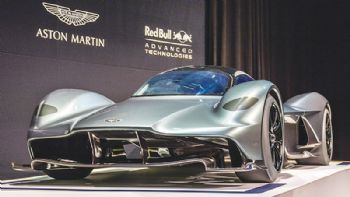
Aston Martin (
www.astonmartin.com) recently appointed Ricardo (
www.ricardo.com/)to design, develop and supply an advanced transmission for the AM-RB 001 ‘hypercar’ that it is creating in collaboration with Red Bull Advanced Technologies. A maximum of 150 road-going AM-RB 001s will be built (including all remaining prototypes), plus 25 track-only versions. Deliveries are due to commence in 2019.
Mark Barge, managing director of Ricardo Performance Products, said: “I am extremely pleased that Aston Martin has selected Ricardo as its technical and supply partner for the transmission of the new AM-RB 001 hypercar. Since the first hypercars were developed, Ricardo has been at the forefront of transmission design, often leading with advanced and innovative technologies for this sector. The partnership with Aston Martin on this transmission marks the start of an exciting new chapter where we will contribute to one of the most innovative cars ever created.”
Meanwhile, Ricardo is also participating in thermo-electric generator research designed to allow waste heat to be recovered and used to improve fuel economy and reduce CO2 emissions. The project, known as Integral, is being led by the ‘Commissariat à l’énergie atomique et aux énergies alternatives’. Thermo-electric materials can directly convert heat into electricity; the conversion yield is low, but when the heat is lost anyway — as in thermal engines or in
energy intensive industries — any benefit is welcome.
The Integral project brought together experts from three sectors where thermo-electric generators are expected to fulfil significant market needs: individual cars, trucks and distance sensors in energy-intensive industries such as metal or glass production. The project is funded by the European Commission with a total budget of 8.5 million euros.